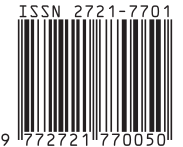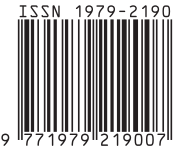Pengendalian Penyakit Layu pada Pisang dengan Bakteri Antagonis Pseudomonas fluorescens dan Bacillus subtilis
Abstract
Fusarium wilt on bananas caused by the fungus Fusarium oxysporum f.sp cubense wereimportant and were distributed most of the centre of bananas farm in Indonesia. Both Culture
technicaly and chemically were unable to control this pathogen because they ability to form
Clamydospore and to infect alternative hosts. The use of antagonistic bacteria such as Pseudomonas
fluorescens and Bacillus subtilis were able to control plant pathogens both in rhizosphere or in
phyllosphere because their ability to produce secondary metabolites such as siderophore, antibiotics,
volatile substances, Cyanide acid, extracellular enzymes and phytohormones. This research was
conducted in Laboratory of Plant Pathology and greenhouse of Pest and Plant Diseases Department.
The steps of research included exploration of antagonistic bacteria using Schaad methods,
identification using Schaad, Palleron, Lelliot and Stead Methods. Last steps were done by in vitro and
in vivo tests.The result showed that combination of two bacterias were able to inhibit the pathogen in
vitro (70,2% - 88,1%), while in vivo test with three to four applications in frequency were able to
decrease disease intensity up to 81, 6%.
Published
2008-03-04
How to Cite
MIHARDJO, Paniman Ashna; MAJID, Abdul.
Pengendalian Penyakit Layu pada Pisang dengan Bakteri Antagonis Pseudomonas fluorescens dan Bacillus subtilis.
Jurnal Pengendalian Hayati, [S.l.], v. 1, n. 1, p. 26-31, mar. 2008.
ISSN 2721-7701.
Available at: <https://jurnal.unej.ac.id/index.php/JPH/article/view/8>. Date accessed: 05 feb. 2025.
Issue
Section
Artikel
Authors who publish with this journal agree to the following terms:
- Authors retain copyright and grant the journal right of first publication with the work simultaneously licensed under a Creative Commons Attribution License that allows others to share the work with an acknowledgement of the work's authorship and initial publication in this journal.
- Authors are able to enter into separate, additional contractual arrangements for the non-exclusive distribution of the journal's published version of the work (e.g., post it to an institutional repository or publish it in a book), with an acknowledgement of its initial publication in this journal.
- Authors are permitted and encouraged to post their work online (e.g., in institutional repositories or on their website) prior to and during the submission process, as it can lead to productive exchanges, as well as earlier and greater citation of published work.







